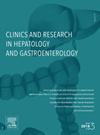Current advances in nanoparticle-based approaches for the hepatocellular carcinoma treatment
IF 2.4
4区 医学
Q2 GASTROENTEROLOGY & HEPATOLOGY
Clinics and research in hepatology and gastroenterology
Pub Date : 2025-01-01
DOI:10.1016/j.clinre.2024.102508
引用次数: 0
Abstract
Hepatocellular carcinoma (HCC) is the most common form of liver (LC) with a high mortality rate, driven by risk factors including viral hepatitis, alcoholic liver disease, and nonalcoholic steatohepatitis. The incident of HCC increases 2–4% of the worldwide population each year which would most certainly exceed one million per year by 2025. Despite advances in our knowledge, 25% of HCC tumors have actionable mutations which demands for innovative treatments strategies. In this perspective, we are providing a comprehensive summary of nanoparticles (NPs) based therapeutic approaches for HCC. We begin with an overview of HCC, concentrating on its pathogenesis, current conventional therapies, and their limitations. Then we delve into the therapeutic application of various nanoparticles (NPs) platforms for HCC, including polymeric micelles, dendrimers, liposomes, solid-lipid nanoparticles, nanostructured lipid carriers, exosomes, niosomes, mesoporous silica nanoparticles, carbon nanotubes. Special attention is given to the application of NPs in photothermal and photodynamic treatment was also investigated, with a focus on their effectiveness in targeted cancer ablation. Additionally, the review discusses recent patents and clinical studies that demonstrate the promise of NPs-based therapies in improving HCC treatment outcomes. This article underscores the potential of NPs based technologies to address the challenges faced by traditional therapies and offers insights into future directions for HCC management.
基于纳米颗粒的肝细胞癌治疗方法的进展。
肝细胞癌(HCC)是最常见的肝脏(LC)形式,死亡率高,其危险因素包括病毒性肝炎、酒精性肝病和非酒精性脂肪性肝炎。HCC的发病率每年增加2-4%的世界人口,到2025年肯定会超过100万。尽管我们的知识有所进步,但25%的HCC肿瘤具有可操作的突变,这需要创新的治疗策略。从这个角度来看,我们提供了基于纳米颗粒(NPs)的HCC治疗方法的综合总结。我们首先概述HCC的发病机制、目前的常规治疗方法及其局限性。然后,我们深入研究了各种纳米颗粒(NPs)平台在HCC中的治疗应用,包括聚合物胶束、树突、脂质体、固体脂质纳米颗粒、纳米结构脂质载体、外泌体、乳泌体、介孔二氧化硅纳米颗粒、碳纳米管。特别关注NPs在光热和光动力治疗中的应用也进行了研究,重点是它们在靶向癌症消融中的有效性。此外,本综述还讨论了最近的专利和临床研究,这些研究表明基于nps的疗法有望改善HCC的治疗结果。本文强调了基于NPs的技术在解决传统疗法面临的挑战方面的潜力,并为HCC管理的未来方向提供了见解。
本文章由计算机程序翻译,如有差异,请以英文原文为准。
求助全文
约1分钟内获得全文
求助全文
来源期刊

Clinics and research in hepatology and gastroenterology
GASTROENTEROLOGY & HEPATOLOGY-
CiteScore
4.30
自引率
3.70%
发文量
198
审稿时长
42 days
期刊介绍:
Clinics and Research in Hepatology and Gastroenterology publishes high-quality original research papers in the field of hepatology and gastroenterology. The editors put the accent on rapid communication of new research and clinical developments and so called "hot topic" issues. Following a clear Editorial line, besides original articles and case reports, each issue features editorials, commentaries and reviews. The journal encourages research and discussion between all those involved in the specialty on an international level. All articles are peer reviewed by international experts, the articles in press are online and indexed in the international databases (Current Contents, Pubmed, Scopus, Science Direct).
Clinics and Research in Hepatology and Gastroenterology is a subscription journal (with optional open access), which allows you to publish your research without any cost to you (unless you proactively chose the open access option). Your article will be available to all researchers around the globe whose institution has a subscription to the journal.
 求助内容:
求助内容: 应助结果提醒方式:
应助结果提醒方式:


